Written by Zeynep Ozkul
A common thread that transcends borders and bonds and unites us all, water is the key to peace and prosperity. As we confront the dual crises of water scarcity and climate change – challenges that define our era – it is crucial that we set a course towards a systemic and transformative approach to improve wastewater management and secure a safe future for all.
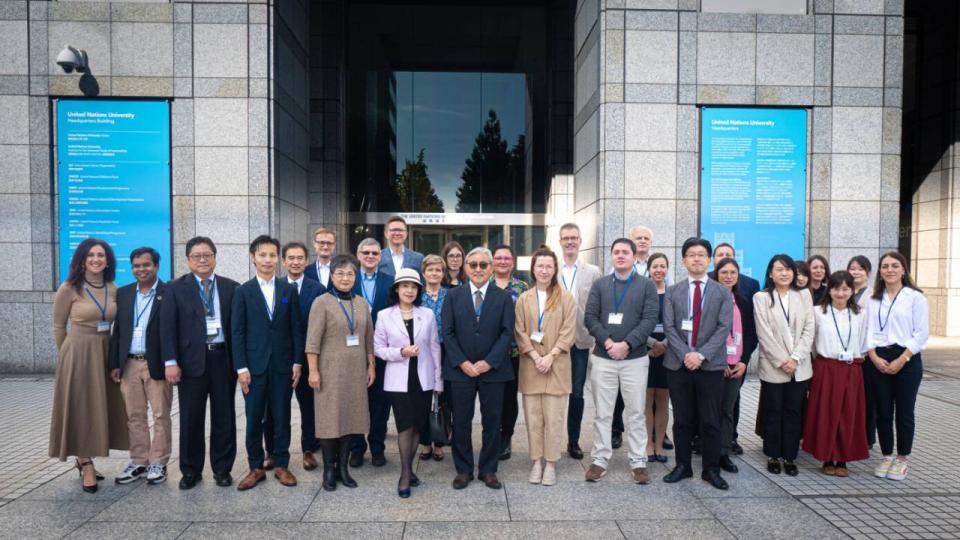
Maintaining business as usual and overstressing our freshwater resources stands to severely hinder our path to achieving sustainable development, as water resources become scarcer, and the impacts of climate change continue to escalate. We must grasp all opportunities to recognise and capture the full value of water, acting via a circular lens toward water management. Closing resource use and reuse loops, while supporting innovative alternatives towards circular societies is essential to reshape economic growth pathways to become sustainable, inclusive, and sensitive to ecological and environmental priorities.
In the heart of Tokyo, the International SMART-WaterDomain Workshop, a collaborative event organised by the United Nations University Institute for the Advanced Study of Sustainability (UNU-IAS) and the United Nations University Institute for Integrated Management of Material Fluxes and Resources (UNU-FLORES), took place from 8-10 November 2023.
The Workshop was a highly successful depiction of the United Nations University’s central role as the academic cornerstone of the United Nations, solidifying UNU’s unique position as an intersecting platform where academia, policy, and society can seamlessly interact. The event brought together project partners, international experts, and researchers from Europe and Japan, creating a diverse and dynamic gathering. The key aspect of this event was its ability to create a multidimensional environment where participants with expertise in different areas found common ground to explore opportunities to recognise and capture the full value of water.
The three-day Workshop served as a forum to create a confluence of knowledge, innovation, and global cooperation between the UNU institutes and the international project partners of the “Framework for Organizational Decision-Making Process in Water Reuse for Smart Cities,” or SMART-WaterDomain – the core mission of which is to boost the adoption of fit-for-purpose reuse water in the agricultural-industrial sector by rethinking urban water systems through circular economy and resilience principles. With the goal of paving the way to a robust decision-making framework for companies and organisations to integrate water reuse practices in their operations, the SMART-WaterDomain project provides implementable strategies that increase the acceptance of water reuse practices for local economies and societies.
The International Workshop was spearheaded by Dr. Serena Caucci, an Associate Programme Officer at UNU-FLORES and the Coordinator and the PI of the SMART-WaterDomain Project. Dr Caucci stressed that the project induces structural changes and contributes to the Sustainable Development Goals (SDGs) across three pivotal levels: at the global stage, as represented by the United Nations, in the national context within individual countries, and at the grassroots level within local communities.
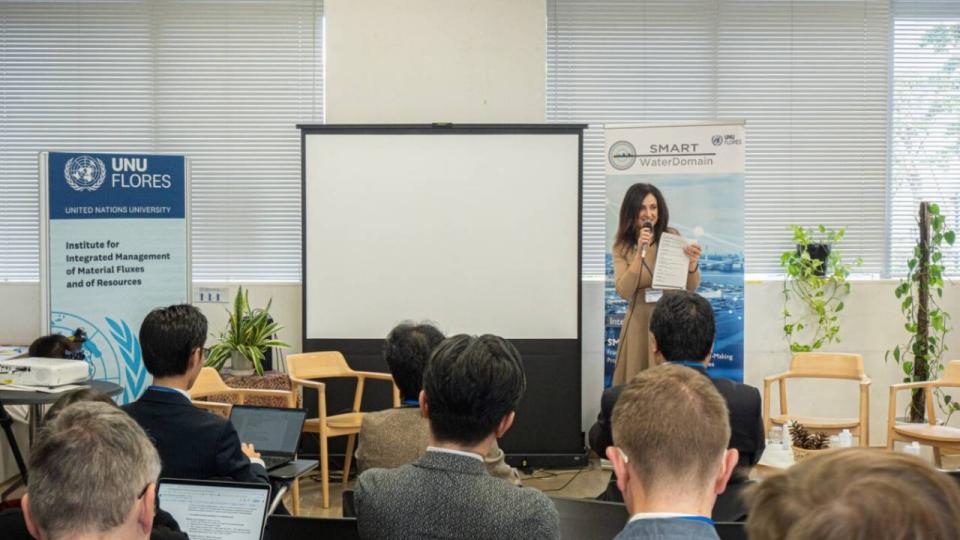
Dr. Caucci briefly introduced the Decision Support Tool—an evaluative mechanism designed by the project to assist organisations in optimising their water management practices. Through a participatory approach that incorporates valuable stakeholder perspectives, the three-day Workshop aimed to enhance the functionality of the tool and explore its potential implementation across Europe and Japan, with the aim of highlighting potential pathways to transition into the Circular Economy.
In a captivating keynote address, the Rector of UNU, Prof. Tshilidzi Marwala, asserted that water lies at the core of the efforts of the United Nations. The 2030 Agenda for Sustainable Development, particularly in pursuit of SDG 6, is a call for transformative action for sustainable water management in a broad, inclusive, and integrated way. Prof. Marwala highlighted the special ability of UNU to build bridges across fields and disciplines to create meaningful action towards a sustainable planet and alleviate its suffering under the strain of the water-related challenges compounded by the climate crisis.
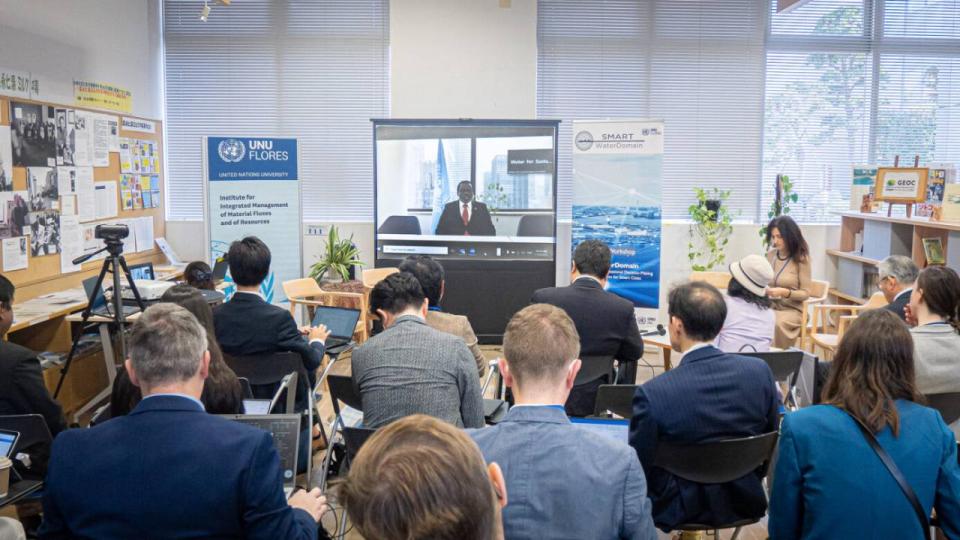
Nevertheless, as we find ourselves beyond the halfway point towards the 2030 target date for achieving the SDGs, the world remains off track to reach the global water target. Professor Marwala underscored a compelling call, emphasising our duty to grasp the profound significance of managing our water resources in a smart and sustainable way. The time to act is now, securing the conservation of this life-sustaining resource for the future well-being of generations to come.
We must take urgent action and do everything in our power to protect our water resources for the well-being of the generations to follow. To make this a reality, we need to come up with clear commitments, pledges, and actions across all sectors to transform our approach to water management.
Echoing this urgency, Prof. Edeltraud Guenther, the Director of UNU-FLORES, accentuated an undeniable reality: that maintaining the status quo is no longer a viable option. Confronting these interwoven challenges demands more than conventional approaches —it calls for daring commitments, ingenious solutions, and collaborations that transcend national boundaries. Professor Guenther drew attention to the role of the SMART-WaterDomain project in developing collaborative methods to optimise urban water management by enhancing the efficacy of public-private partnerships. With roots in the Resource Nexus concept, SMART-WaterDomain aims to uncover insights and knowledge-driven solutions that directly contribute to bolstering urban sustainability.
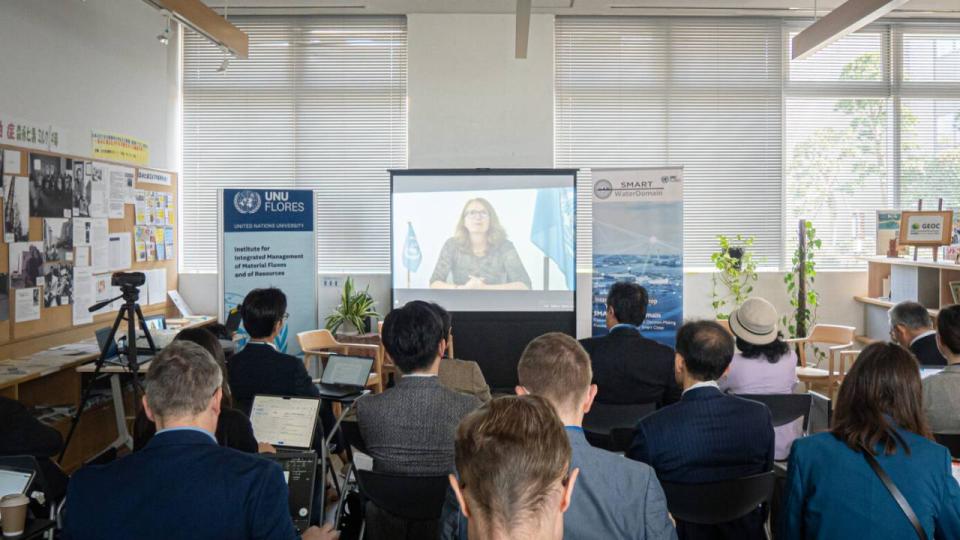
Showcasing the captivating story of Japan’s remarkable success in industrial water reuse, Prof. Shinobu Yume Yamaguchi, Director of UNU-IAS, reflected on the early history of water management in Japan since the 1950s. Japan’s commendable dedication to achieving an impressive 80% recycling rate for industrial water stands as a testament to the nation’s unwavering commitment to sustainability and cutting-edge water management practices through the extensive use of various technologies, regulations, and systems. Professor Yamaguchi further spoke to the significance of the SMART-WaterDomain in terms of the project’s transformative potential to shape a world where water ceases to be a source of worry and instead rejuvenates into a thriving source of life.
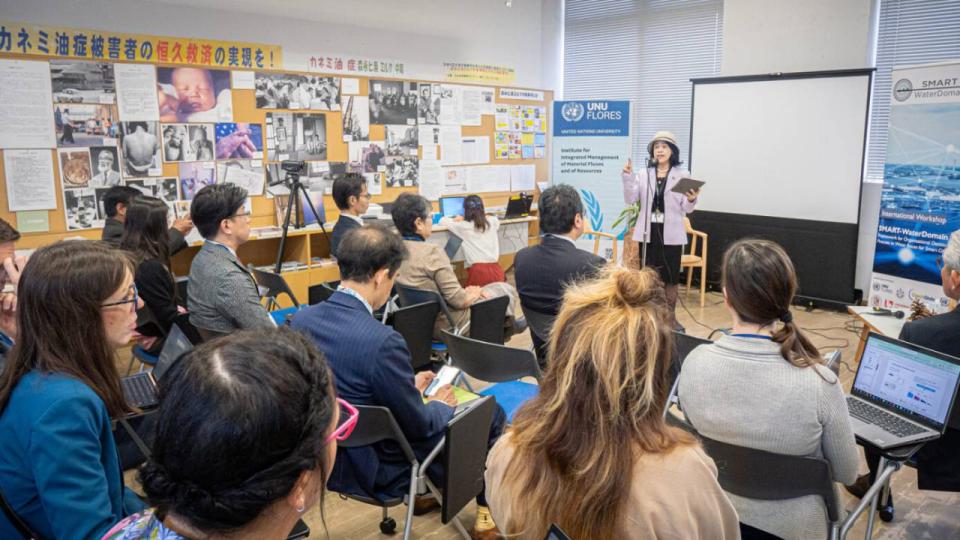
The panel session of the Workshop featured internationally renowned experts, including the Research and Development Initiative of Chuo University, Prof. Hiroaki Furumai, Mr Yu Kamei, the Director of the International Cooperation Office within the Environment Management Bureau at the Ministry of the Environment in Japan, and Prof. Futaba Kazama, who serves as a Specially Appointed Professor at Yamanashi Prefectural University.
The panellists reiterated the dire need to move beyond conventional approaches to water management, in favour of adopting a circular perspective, strategically aimed at mitigating the vulnerability of freshwater systems to the profound impacts of climate change. At its core, the dialogue examined multifaceted approaches tailored to governmental agencies, businesses, and society at large, and advocated for the collective acknowledgement of the inherent value of freshwater.
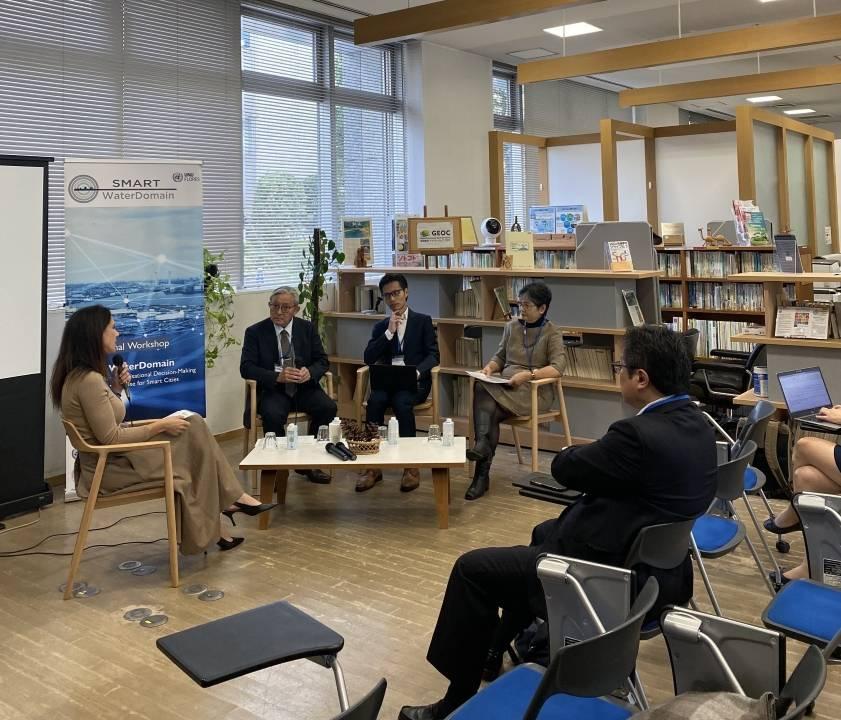
The resulting discussions addressed the potential of the increased utilisation of water reuse as a viable and sustainable alternative resource, thus paving the way for groundbreaking advancements in water resource management – not only in the context of the complex challenges posed by climate change, but also in terms of developing resilience in the face of water stress.
The International SMART-WaterDomain Workshop explored three critical dimensions that are integral to shaping a modern, sustainable, circular approach to water management:
Inclusivity through Public-Private Partnerships: The inclusion of public-private partnerships (PPPs) is critical to achieving our socio-economic development objectives; all stakeholders must become involved and proactive to maximise synergies and design practical solutions. Governments and international organisations can only achieve the ambitions of the 2030 Agenda for Sustainable Development with the active inclusion of the private sector. Modernising water management strategies and adapting to climate change will require tremendous financing, and it is only through partnerships and cooperation that we can put the pieces together.
Innovative Approaches and Technologies: The adoption of innovative approaches and cutting-edge technologies to strengthen sustainable water management. The incorporation of digital technologies and smart water management approaches will help us usher in a new era of water transition and expedite transformations in the water sector. Today, organisations in all sectors are increasingly under pressure to reduce the negative environmental impact of their activities and collect, evaluate, and manage water-related information. This is precisely why the efforts of SMART-WaterDomain are vital to strengthening the capacity of organisations and businesses by helping them optimise their water use and set environmentally friendly solutions that bring concrete economic benefits.
Global Collaboration: Throughout the course of project, all the project partners – from across Europe and Japan – have demonstrated their commitment to developing cutting-edge solutions that will help us adapt to the new reality of heightened water stress in the future. By mobilising stakeholders from diverse domains to take proactive steps to promote the positive perception of wastewater use and to maximise its potential as a valuable and sustainable resource, the partners share a common aspiration: to mitigate the water crisis in a more sustainable, inclusive, efficient, and resilient, interconnected way.
The transformative approach of the International SMART-WaterDomain Workshop has not only facilitated the exchange of knowledge but has also acted as a nexus for fostering inclusive partnerships. By bringing together project partners, public and private stakeholders, researchers, and students, the workshop embraced a diverse array of perspectives and experiences from around the globe for catalysing innovation and effective governance toward achieving global targets in sustainable water management.
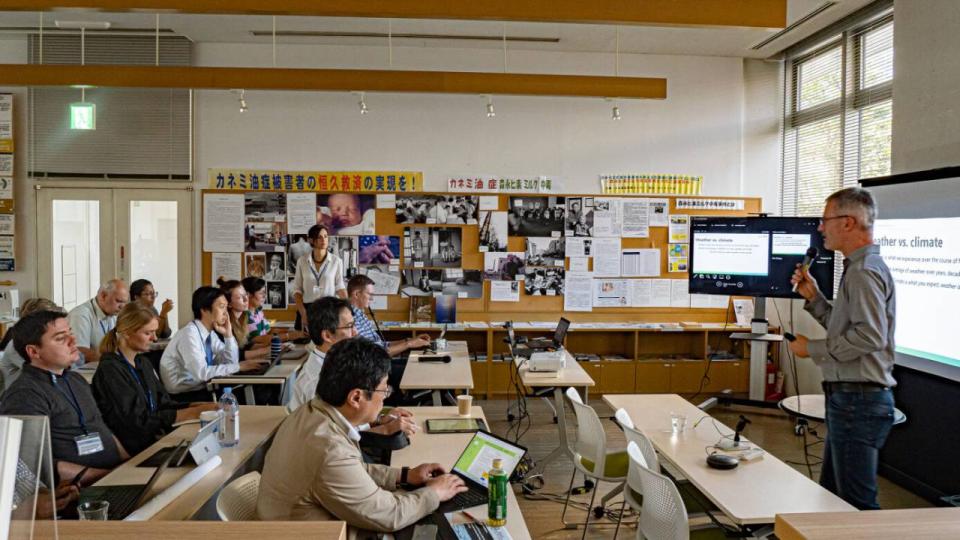
The workshop’s emphasis on inclusivity sheds light on the key role of public-private partnerships in confronting the intricacies of complex challenges. As we look to the future, the impact of this inclusive cooperation promises to scale up the development efforts and stands as the cornerstone of sustainable and resilient solutions to global water challenges, while contributing to the achievement of the SDGs. In working alongside countries and private sector partners, the project will continue to facilitate the use of PPPs to enable and facilitate innovative, effective, and context-sensitive ways to stimulate and scale up investments and finance for circular and smart water management.
By fostering potential collaborations between public and private entities within the private-public partnership framework, SMART-WaterDomain seeks to optimise urban water management by enhancing the efficacy of public-private partnerships in utilising treated municipal wastewater within the industrial sector.
In functioning as the academic arm of the United Nations, the United Nations University remains committed to connecting academic expertise, policy frameworks, and societal dynamics. The collaborative initiatives that have been successfully exemplified by the SMART-WaterDomain Project aim to develop integrated strategies and accelerate targeted actions to drive progress towards the United Nations’ Sustainable Development Goals (SDGs), and will continue to lay the groundwork for substantive actions toward a future characterised by sustainability, equity, and inclusivity.




